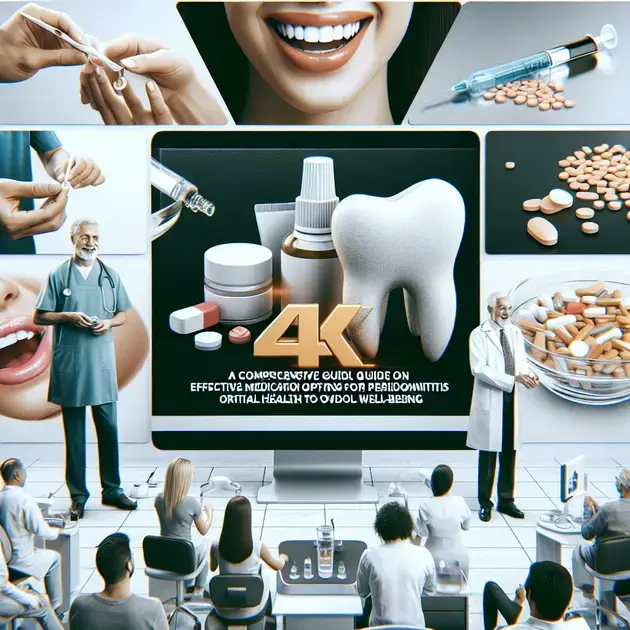When it comes to effectively treating periodontitis, finding the right medication is crucial. With advancements in dental research, there are now various options available for patients seeking an Effective Medication for Periodontitis Treatment.
From antimicrobial mouth rinses to antibiotic gels, the choices can be overwhelming. In this blog post, we will explore the most up-to-date information on the medications that have shown to be highly effective in combating periodontitis and improving oral health.

Choosing the Best Medication for Periodontitis
When it comes to choosing the best medication for periodontitis, it is important to consult with your dentist or periodontist to determine the most effective treatment plan for your specific case. They will consider factors such as the severity of your gum disease, any underlying health conditions, and your medical history before recommending a medication.
One of the common medications prescribed for periodontitis is antibiotics. These can help to eliminate the bacteria causing the infection and reduce inflammation in the gums. Your healthcare provider may prescribe antibiotics in the form of pills, mouth rinse, or topical gel, depending on the severity of your condition.
Another option for treating periodontitis is antimicrobial mouthwashes. These mouthwashes contain ingredients that can help reduce the bacteria in your mouth and prevent further infection. Your dentist may recommend a specific brand or type of mouthwash based on your individual needs.
In some cases, your dentist may also recommend non-steroidal anti-inflammatory drugs (NSAIDs) to help manage pain and inflammation associated with periodontitis. These medications can be taken orally or applied topically to the affected area to provide relief.
To ensure you are choosing the best medication for your periodontitis, it is crucial to follow your dentist’s instructions carefully and attend regular follow-up appointments to monitor your progress. By staying committed to your treatment plan and maintaining good oral hygiene practices, you can improve your gum health and prevent further damage from periodontitis.
Effective Medication Options for Periodontitis
There are several effective medication options available for treating periodontitis, each with its own unique benefits and considerations. One common medication used for periodontitis is chlorhexidine, a prescription mouthwash that can help reduce plaque buildup and fight bacteria in the mouth.
Another effective medication option is doxycycline, an antibiotic that can be taken orally to reduce inflammation and promote healing in the gums. Your dentist may prescribe this medication in conjunction with other treatments, such as scaling and root planing, for enhanced results.
For more severe cases of periodontitis, your dentist may recommend systemic antibiotics to target bacteria throughout your body. These medications are typically prescribed for a short period and may require regular monitoring to assess their effectiveness and any potential side effects.
In addition to prescription medications, there are also over-the-counter options available for managing symptoms of periodontitis, such as pain relievers and anti-inflammatory gels. However, it is essential to consult with your dentist before using these products to ensure they are safe and appropriate for your condition.
By discussing your treatment options with your healthcare provider and following their recommendations diligently, you can effectively manage your periodontitis and improve your overall oral health in the long term.
Maximizing Treatment Results with the Right Medication
To maximize the results of your periodontitis treatment, it is essential to take the prescribed medication as directed by your dentist and adhere to any additional recommendations they provide. This may include following a strict oral hygiene routine, attending regular dental cleanings, and making lifestyle changes to support gum health.
It is crucial to communicate openly with your healthcare provider about any concerns or difficulties you may have with your medication regimen. They can offer guidance on managing side effects, adjusting dosages if needed, or exploring alternative treatment options to ensure your comfort and compliance.
In some cases, your dentist may recommend using adjunctive therapies alongside your medication, such as laser therapy or locally applied antimicrobials, to enhance the effectiveness of your treatment. These additional treatments can help target stubborn bacteria and promote faster healing in the gums.
Regular monitoring and follow-up appointments are also key to maximizing treatment results with the right medication. Your dentist will evaluate your progress, make any necessary adjustments to your treatment plan, and provide ongoing support to help you achieve optimal oral health outcomes.
By actively participating in your periodontitis treatment and working closely with your healthcare team, you can increase the likelihood of successful outcomes and enjoy a healthier, happier smile for years to come.

Effective Medication Options for Periodontitis
Periodontitis is a common yet serious gum infection that damages the soft tissue and destroys the bone that supports your teeth. It is essential to effectively manage periodontitis to prevent tooth loss and maintain oral health. One of the key components of treating periodontitis is the use of effective medication options. These medications can help control the bacteria that cause the infection and reduce inflammation in the gums.
One effective medication option for periodontitis is antimicrobial mouth rinses. These mouth rinses contain active ingredients that help reduce the amount of bacteria in the mouth, promoting healthier gums. Another medication option is oral antibiotics, which can be prescribed by your dentist or periodontist to help control the infection and prevent it from spreading further.
In more severe cases of periodontitis, your dentist may recommend the use of antiseptic chips or gels. These products are placed directly into the pockets in your gums where bacteria thrive, providing targeted treatment for the infection. Additionally, local antibiotics can be administered directly into the pockets to help eliminate bacteria and promote healing.
It is essential to follow your dentist’s recommendations and complete the full course of medication to ensure effective treatment of periodontitis. Along with medication, maintaining good oral hygiene practices, such as regular brushing and flossing, is crucial for managing the condition and preventing recurrence.
Maximizing Treatment Results with the Right Medication
Choosing the right medication is crucial for maximizing treatment results when dealing with periodontitis. Your dentist will consider the severity of the infection, your overall health, and any potential side effects when determining the most suitable medication for your condition. It is essential to communicate any existing medical conditions or allergies to ensure the medication prescribed is safe for you to use.
In some cases, a combination of medications may be recommended to effectively manage periodontitis. This approach can target different aspects of the infection, such as controlling bacteria growth and reducing inflammation, to achieve optimal treatment results. Your dentist will provide clear instructions on how to use the medications, including dosage and duration of treatment.
Regular follow-up appointments with your dentist are essential to monitor the progress of treatment and make any necessary adjustments to the medication plan. It is crucial to report any changes or concerns during the treatment process to ensure timely intervention and successful management of periodontitis.
Remember that medication alone is not enough to address periodontitis effectively. Maintaining a healthy lifestyle, including a balanced diet and regular exercise, can support the treatment process and improve overall oral and general health. By following your dentist’s recommendations and actively participating in your treatment plan, you can maximize the results of medication for periodontitis.
Understanding the Connection Between Oral Health and Overall Well-being
The health of your mouth is closely linked to your overall well-being, highlighting the importance of maintaining good oral hygiene habits and seeking appropriate treatment for conditions like periodontitis. Research has shown that oral health problems, such as gum disease, can contribute to systemic conditions like diabetes, heart disease, and respiratory issues.
When left untreated, periodontitis can lead to chronic inflammation in the body, affecting various organs and systems. By managing periodontitis effectively with the right medication options and consistent oral care, you can reduce the risk of complications and improve your overall health.
Good oral hygiene practices, including regular brushing, flossing, and dental check-ups, play a significant role in preventing oral health problems and maintaining a healthy mouth. Combined with appropriate medication for periodontitis, these habits can support your overall well-being and contribute to a higher quality of life.
It is essential to recognize the interconnection between oral health and general health and prioritize both aspects in your daily routine. By taking proactive steps to care for your oral health and seeking timely treatment for conditions like periodontitis, you can enhance your overall well-being and enjoy a healthier, happier life.
Conclusion
In conclusion, effective medication options play a crucial role in the management of periodontitis, a serious gum infection that can lead to tooth loss and impact overall oral health. Antimicrobial mouth rinses, oral antibiotics, antiseptic chips, and gels are valuable tools in controlling bacterial growth and reducing inflammation, essential for treating periodontitis.
Maximizing treatment results involves choosing the right medication based on the severity of the infection, overall health, and potential side effects. Combining medications may be necessary for comprehensive treatment, targeting different aspects of the infection to achieve optimal results. Clear communication with your dentist, adherence to medication guidelines, and regular follow-up appointments are vital for successful management of periodontitis.
The connection between oral health and general well-being is significant, underscoring the importance of maintaining good oral hygiene practices and seeking timely treatment for conditions like periodontitis. With proper medication, consistent oral care, and a healthy lifestyle, the risk of complications can be reduced, and overall health can be improved, leading to a higher quality of life.



